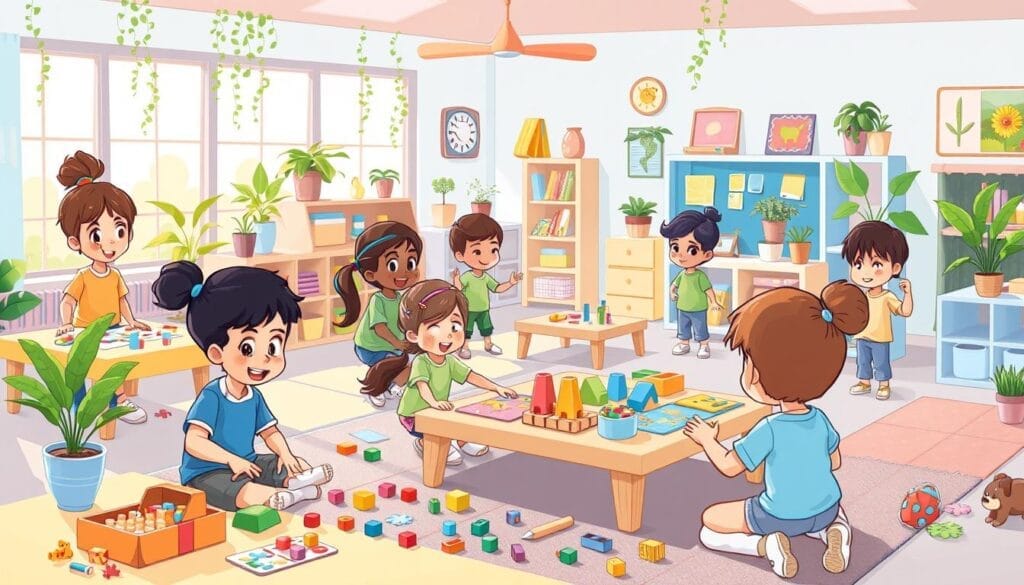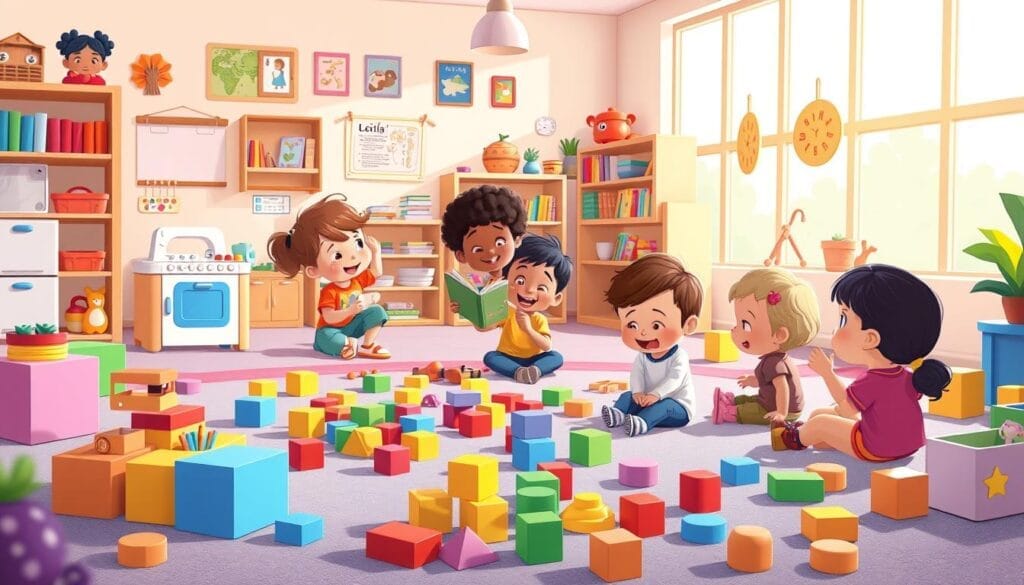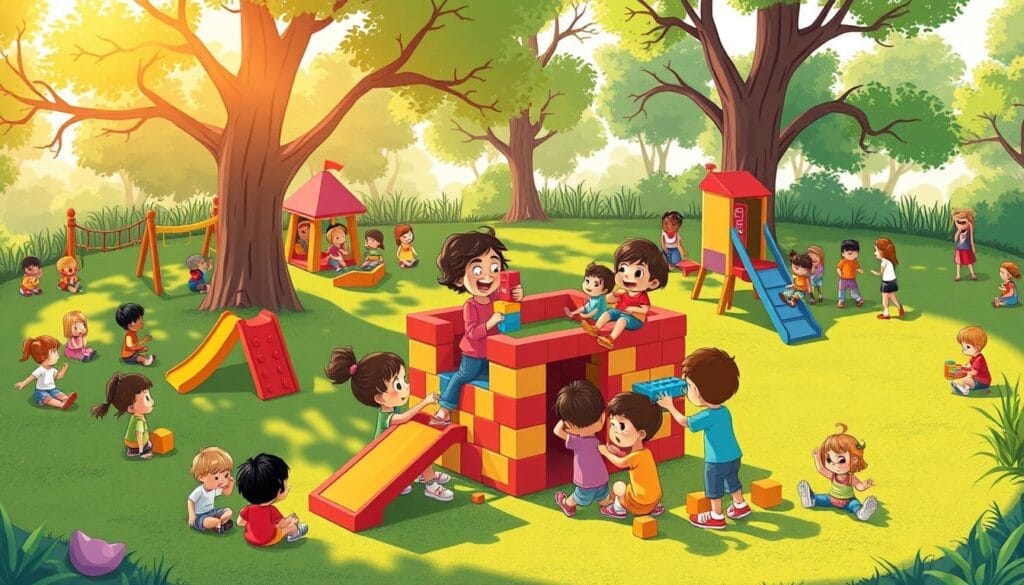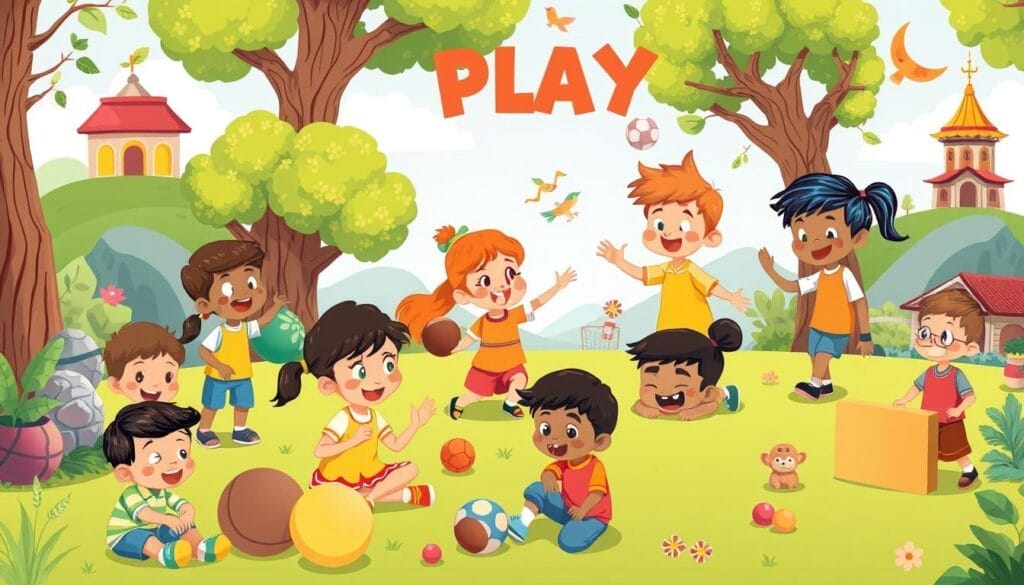Play is key in building trust and is full of empowering and connecting moments. It helps overcome fear and teaches important social skills. Through play, kids grow their emotional and thinking abilities.
Play is when kids choose what to do and follow their own rules. It’s filled with imagination. Different kinds of play include moving around, building things, using language, pretending, and playing games.
For a growing brain, the benefits of play in cognitive development are too important to ignore.
In this blog, we will break down what cognitive development really means, how different types of play affect the brain, and why making time for playful learning should be non-negotiable for every child. We’ll also explore proven research, expert-backed recommendations, and tips you can start using right now.
Table of Contents
ToggleUnderstanding Cognitive Development
Before diving into play, it helps to understand what’s happening in a child’s brain as they grow. Let’s simplify this complex process.
What is Cognitive Development?
Cognitive development means how a child learns, remembers, solves problems, and understands the world. It includes attention, memory, language, and logic.
Key stages of cognitive development (Piaget’s theory):
| Stage | Age Range | Key Developments |
|---|---|---|
| Sensorimotor | 0–2 years | Learns by touching, seeing, hearing |
| Preoperational | 2–7 years | Begins using language, imagination forms |
| Concrete Operational | 7–11 years | Understands rules and logic |
| Formal Operational | 12+ years | Thinks abstractly and plans ahead |
Brain areas involved in cognition:
- Prefrontal cortex: Focus and decision-making
- Hippocampus: Memory building
- Temporal lobe: Language skills
- Cerebellum: Coordination and thinking speed
The brain’s structure supports learning through play. This is where the benefits of play in cognitive development begin to shine.
Why the Early Years Matter
Children’s brains are most flexible in the first few years. This is when learning is fastest—and play has the biggest impact.
According to the Harvard Center on the Developing Child, the brain forms 700 new neural connections per second during early childhood.
- These connections shape future learning and behavior.
- Play helps form, strengthen, and prune these neural pathways.
- Delays or limits in playful activities can reduce learning speed.
So, the earlier we tap into the benefits of play in cognitive development, the better the long-term results.
The Science Behind Play and Brain Growth
Play isn’t just fun, it’s biological. Let’s look at how the brain responds to play activities.
How Play Stimulates Brain Function?
Play triggers activity in brain regions that control memory, attention, and emotional balance. It changes the brain physically and chemically.
- Stimulates synaptic growth: Playing strengthens brain connections.
- Boosts dopamine: Play activates the brain’s reward system.
- Supports curiosity: Encourages exploration and creativity.
- Unstructured vs structured play:
- Unstructured play = child-led, open-ended (more beneficial for imagination)
- Structured play = adult-led with specific rules (helps with discipline and teamwork)
Even five minutes of open play can improve problem-solving and focus.
Neuroscientific Insights
Brain imaging gives us proof that play changes brain function.
- MRI scans show pretend play increases prefrontal cortex activity.
- Executive function improves: planning, control, switching tasks.
- Studies confirm that pretend play and learning go hand in hand.
- Brain scans from the University of Arkansas and University of Wisconsin prove:
- Imaginative play boosts working memory.
- Symbolic play leads to stronger language networks in the brain.
These findings reinforce the benefits of play in cognitive development in a visible way.

The Different Types of Play and Their Impact on Cognitive Skills
Different types of play shape different skills. Let’s explore how each kind supports cognitive growth through play.
Pretend Play (Imaginative Play)
This type includes role-playing, make-believe, and using imagination to create stories.
- Boosts abstract thinking and flexible thinking.
- Encourages problem-solving and planning.
- Builds social understanding and theory of mind.
A study in the Journal of Experimental Child Psychology showed that children who engaged in pretend play scored higher in verbal fluency.
Pretend play is the core of early childhood cognitive development.
Read: Lack of Protein in Indian Diet: Causes, Symptoms, and Solutions
Constructive Play (Building, Drawing)
This includes puzzles, blocks, crafts, and drawing.
- Improves spatial reasoning.
- Teaches sequencing and planning.
- Supports math thinking, patterns, and geometry.
Even stacking cups or drawing shapes can spark brain development.
Physical Play (Running, Climbing)
Active play supports physical and mental coordination.
- Boosts motor planning and balance.
- Enhances focus and attention span.
- Improves response inhibition and brain-body control.
Children who play physically show better performance in class, especially in tasks needing memory and quick thinking.
Social Play (Group Games, Roleplay)
Playing with others teaches emotional and mental skills.
- Develops language through dialogue.
- Teaches sharing, negotiation, and turn-taking.
- Helps kids read emotions and respond properly.
The benefits of play in cognitive development extend to emotional regulation too.
Digital Play: A Modern Consideration
With screens now a part of childhood, digital play must be understood and used wisely.
Pros:
- Some educational games build vocabulary and logic.
- Interactive stories can support memory and comprehension.
Cons:
- Passive screen time limits creativity.
- Too much digital input reduces outdoor play.
So, what counts as healthy digital play?
- Under 2 hours a day
- Educational, problem-solving games
- Involves interaction, not just watching
Digital games can support play and brain development when used thoughtfully
The Benefits of Play in Cognitive Development
Now let’s talk about the real results. These are the most talked-about benefits of play in cognitive development.
Memory and Attention Improvements
Games like Simon Says or memory card games can boost short-term and working memory.
- Improves attention span and listening
- Helps with faster recall
- Trains the brain to store and retrieve info quickly
Children who engage in play-based tasks show 20% better memory retention, according to a study by Stanford University.
Enhancing Problem-Solving and Creativity
Play lets kids try, fail, and figure things out without pressure.
- Open-ended tasks promote divergent thinking
- Less fear of failure encourages more attempts
- Builds planning and strategic thinking
Creative children scored 50% higher in divergent thinking tests (Journal of Applied Developmental Psychology).
Better Language and Communication
Language is best learned through stories, dialogue, and imitation.
- Storytelling during play builds vocabulary
- Repetitive games enhance speech fluency
- Roleplay strengthens grammar and sentence use
This is one of the underrated benefits of play in cognitive development.
Emotional Intelligence and Self-Regulation
Play helps children manage emotions and behavior.
- Teaches waiting turns, sharing, and adjusting to others
- Builds impulse control
- Encourages self-soothing and patience
Play literally teaches kids how to behave in the real world.

Play as a Tool for Emotional Regulation
Play is key for kids to learn about feelings and control them. It helps them understand and share their emotions in a good way. Pretend play lets kids safely try out different feelings and learn to care about others.
Understanding Emotions Through Play
Kids get to act out feelings like sharing or feeling happy or mad during play. This helps them know their own feelings and see others’ too. The playful learning strategies in these activities help kids grow emotionally smart.
Building Resilience and Coping Strategies
Play helps kids become strong and learn to deal with tough times. When they face problems in play, they learn to solve them and handle their feelings. This play’s impact on executive functions helps them manage their emotions for life.
Play is a powerful way to help kids grow in all areas. It supports their thinking, social, and emotional growth.
Read: How Stress Affects Brain Development in Children
The Impact of Unstructured Play
Unstructured play, or free play, is great for kids’ brains. It lets them explore and create freely. This helps them think creatively and solve problems on their own.
It also helps them learn to make choices and control their actions. This is key for growing up smart.
Benefits of Free Play
Free play helps kids learn important social skills. They learn to work together and solve conflicts. It also boosts their confidence and creativity.
Plus, it makes them love learning. All these things are good for their minds.
Encouraging Creativity and Imagination
Creating a space for kids to play freely is important. It lets them use their imagination and play on their own terms. Outdoor play is especially good for kids.
It helps them grow strong and happy. It’s good for their bodies and minds.
Play is essential for kids to grow well. It helps them with physical skills and emotional control. It’s important to balance play with learning activities.
This way, kids can grow up smart and happy. Parents and teachers play a big role in this.
Role of Structured Play in Learning
Structured play is key for kids’ brains to grow. It includes games and activities that teach specific skills. Kids learn in fun ways, like through games and puzzles.
By playing, kids get better at school stuff. They think more clearly and remember things better.
Educational Games and Activities
Games like board games and puzzles are great for kids. They teach kids to follow rules and work together. Kids learn new things and get better at solving problems.
Goal-Directed Play
Structured play also means activities like sports and coding. Kids aim to get better at something new. This helps them set and reach goals.
Play like this is super important for kids. It makes them smarter and better at solving problems. It’s all about learning in a fun way.
Play and the Development of Executive Functions
Play is key in growing executive functions. These include skills like working memory and planning. Kids learn to plan and make decisions through play.
Understanding Executive Functions
Executive functions help us plan and remember things. They are important for school and life success. These skills let us handle many tasks at once.
How Play Strengthens Self-Control
Social play makes kids better at self-control. They learn to share and follow rules. Pretend play also helps kids control their impulses.
Research shows play is vital for learning. Kids who control their impulses do better in school. They are also better at social skills.
Play-based programs help young kids grow. The “Building Brains and Futures” program shows great results. It improves language and motor skills.

Social Benefits of Play in Cognitive Development
Play has many social benefits that help a child grow. It teaches them to make friends, share, and work together. These skills help them understand others and solve problems.
Building Relationships Through Play
Playing with friends helps kids learn important social skills. They learn to take turns and share. This builds their emotional smarts and helps them deal with tough social situations.
Cooperation and Teamwork
Playing together teaches kids to work as a team. They learn to compromise and solve problems together. These skills are key for success in school and work later on.
Play is vital for a child’s growth, including their brain development. It teaches them how to make friends and work well with others. These skills are important for life.
Play in Different Cultural Contexts
Play looks different in every culture. It shows the unique values and traditions of each place. Yet, play is a key part of learning for kids everywhere.
Studies show that play helps kids learn about their culture. It also helps them get along with others and think on their feet. By looking at how play changes, we can learn more about how kids grow up.
Variations in Play Practices
Most research on play comes from Europe and the US. It talks about how play helps kids grow up. But, in other parts of the world, like Guatemala, play is seen as just part of growing up.
In Papua New Guinea, kids learn by doing real tasks. They help with food and home chores. This is how they learn early on.
How people see play’s role in growing up varies a lot. For example, in Cameroon, kids play in many ways, like hunting and making clothes. But in Europe, playing rough with dads is seen as important for bonding.
Even though play looks different everywhere, it’s a big part of being human. It shows how kids are the same all over, but also how they are shaped by their culture.
Cross-Cultural Benefits of Play
Play is found in every culture where kids are studied. It shows that play is a universal part of being human. But, it’s shaped by where we grow up.
Girls and boys play differently, everywhere. Boys like to play in big spaces and move a lot. Girls often play in smaller groups and focus on social things.
How much time kids have to play changes a lot. In some places, kids help out a lot. But in others, they have lots of space to play freely.

Most studies on play are from Western countries. But, we need to learn more about play in different places. This helps us make better rules for kids, especially in diverse places.
Studies that Prove the Power of Play
What does the science say? These studies confirm the brain-boosting effects of play.
Landmark Studies in Child Development
- Tools of the Mind Curriculum – Based on Vygotsky’s theories
- Play-based learning improved focus, memory, and academic scores
- University of Cambridge Study (2022)
- Found structured pretend play led to higher language and math scores in 4-year-olds
- National Institute for Play Findings
- Emphasized play as essential to human development
These programs prove that the benefits of play in cognitive development are more than a theory, they’re reality.
Global Guidelines from Experts
World Health Organization (WHO)
- Recommends at least 3 hours of play daily for children under 5
UNICEF
- Play is a right, not just an activity
American Academy of Pediatrics (AAP)
- “Play is essential to development.”
- Pediatricians are encouraged to prescribe play during visits
These global bodies agree that early childhood cognitive development is impossible without play.
Practical Tips for Parents and Educators to Encourage Cognitive Play
Here’s how to add more cognitive-rich play into your child’s day.
Age-Wise Play Recommendations
| Age Range | Suggested Play Types |
| 0–2 yrs | Sensory bins, stacking, peek-a-boo |
| 2–5 yrs | Roleplay, drawing, building blocks |
| 5–8 yrs | Rule-based games, puzzles, cooperative board games |
Match play to the child’s developmental stage to get maximum benefit.
Create a Brain-Enriching Play Environment
- Keep screens off during play
- Use toys that don’t have only one right answer
- Let kids get bored, it leads to imagination
- Provide a safe, open space to explore freely
Play should be easy to access, not something scheduled.
Role of Adults in Play
- Let children lead the game
- Ask guiding questions (“What happens next?”)
- Teachers should use scaffolding, gently guiding, not controlling
Adults help direct attention without stealing creativity.
Need Expert Advice? Consult Dr. Chandril Chugh Today
Understanding the science is one thing. Applying it to your child’s needs is another. If you want to ensure your child grows smarter through play, don’t guess, get expert advice.
Dr. Chandril Chugh is a US-trained, board-certified neurologist. He treats memory issues, sleep problems, migraines, stroke recovery, and pediatric ADHD. His expertise in early childhood cognitive development helps parents create smarter, happier futures for their kids.
Book a direct consultation with Dr. Chandril Chugh and learn how to maximize the benefits of play in cognitive development for your child.
FAQ
What is the role of play in cognitive development?
Play is key for kids’ brain growth. It helps them learn and grow in many ways. Kids solve problems, learn new words, and control their feelings through play.
How does play contribute to different stages of cognitive development?
Kids go through different stages of brain growth. Play helps them at each stage. It prepares them for learning and solving problems later on.
What types of play are most effective in stimulating cognitive growth?
Many types of play help kids grow. Sensory, constructive, and social play are all good. They help kids solve problems, learn new words, and control their feelings.
How does play enhance problem-solving skills?
Play makes kids think and find solutions. It teaches them to be creative and keep trying. These skills help them do well in school and life.
What is the relationship between play and language development?
Play, especially language play, helps kids learn words. It lets them try out new sounds and words. This improves how they talk and communicate.
How does play contribute to emotional regulation and social-emotional skills?
Play helps kids deal with feelings in a safe way. It teaches them to be kind and understand others. This builds their strength and how they handle tough times.
What are the benefits of unstructured play?
Free play lets kids explore and create freely. It helps them make choices, solve problems, and be creative. It’s great for their brain and imagination.
How does structured play contribute to cognitive development?
Structured play, like games, teaches important skills. It helps kids learn to follow rules and work together. This boosts their brain power.
What is the role of play in the development of executive functions?
Play, especially with others, teaches kids to plan and make decisions. It helps them control themselves and work well with others. These skills are very important for the brain.
How do the social benefits of play contribute to cognitive development?
Social play helps kids make friends and work together. It teaches them to see things from others’ viewpoints. This is key for understanding and feeling emotions.
How does play vary across different cultures, and how does this impact cognitive development?
Play looks different in every culture. But, it always helps kids grow and learn. It teaches them about their culture and how to adapt to new situations.
What does research say about the benefits of play in cognitive development?
Many studies show play is good for kids’ brains. It helps with self-control, social skills, and overall brain growth. Experts say we should make play a big part of learning.
About The Author

Medically reviewed by Dr. Chandril Chugh, MD, DM (Neurology)
Board-Certified Neurologist
Dr. Chandril Chugh is a U.S.-trained, board-certified neurologist with expertise in diagnosing and managing neurological disorders, including migraines, epilepsy, Parkinson’s disease, and movement disorders. His clinical focus includes evidence-based neurological care and patient education.
All content is reviewed for medical accuracy and aligned with current neurological guidelines.




